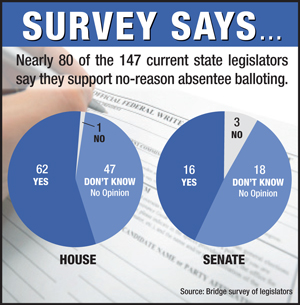Bridge survey finds big support for easier absentee voting, yet legislation lags
Michigan has plenty of people who commit a crime come election time.
They aren’t trying to vote twice, or do anything to improperly tilt the results of an election.
They simply want to vote at their convenience. But in Michigan, convenience is something meant for only a select group of voters: the elderly, the disabled, the businessperson traveling on Election Day.
For the regular voter who has a busy Tuesday ahead and wants to get the voting out of the way earlier, Michigan law has one simple answer: no.
Yet, somehow, last November about 25 percent of the votes cast in the general election were via absentee ballots. Almost assuredly some of them were the product of applications that were fraudulent, filled out by voters who could have gone to the polls on Election Day, but who just preferred a different option.
They marked one of the six legal boxes on the application form – likely the first (“I expect to be absent from the community in which I am registered for the entire time the polls are open on election day”) – and signed the form. In doing so, they committed a crime, a misdemeanor.
Bills to allow all voters to choose the absentee ballot are perennials at the State Capitol. Little fuss is made over them, however, and they usually expire quietly.
Johnson pushes ‘no reason’
Secretary of State Ruth Johnson says she wants to change that this year and bring “no-reason” absentee balloting to Michigan. In that goal, she has the support of Gov. Rick Snyder and says, “We’ve been working very hard in communicating with legislators … My staff has been doing a great job. I’m very optimistic to get it through this year.”
A Bridge Magazine survey of all 147 current lawmakers would indicate Johnson’s persuasion campaign has carried the day. A majority of lawmakers (78) say they support “no-reason” absentee balloting, compared to only four who said they would oppose it (55 others, including House Speaker Jase Bolger and Senate Majority Leader Randy Richardville, said they weren’t sure or declined to offer an opinion).
Do your legislators favor 'no-reason'?
Yet, not only does the absentee ballot law remain as restrictive as ever, Johnson’s concept hasn’t even been filed as a bill at the State Capitol.
 The legislator Johnson is relying upon to sponsor the change – Republican Rep. Cindy Denby of Handy Township – does plan to file a bill, just as she did in the last Legislature. But her staff says the bill remains in draft form and they are not certain when it will be filed.
The legislator Johnson is relying upon to sponsor the change – Republican Rep. Cindy Denby of Handy Township – does plan to file a bill, just as she did in the last Legislature. But her staff says the bill remains in draft form and they are not certain when it will be filed.
Sue Smith isn’t surprised at the lack of progress, but expressed hope about Denby’s bill.
“As you know, the leadership of the majority party controls the agenda, and I know that (bills have) gone to committee and the committee chair has not allowed it to be discussed. I don’t know why the Republican leadership appears to be opposed to having this discussed and voted upon,” said the president of the League of Women Voters-Michigan.
At least four no-reason voting bills were filed this winter, including House Bill 4252, which has both Democratic and Republican co-sponsors.
None of those bills has moved from committee.
“I think (having Republican Denby file a bill) would make a difference,” Smith said. “It would be wonderful if there could be bipartisan support. I’m not sure how much conversation Secretary Johnson has had with the leadership, but that’s key if it’s going to reach the committee floor and have an opportunity for debate and a vote.”
Absentee, but in-person
Michigan is one of 15 states nationwide that have restricted absentee balloting and also bar early voting.
Johnson’s plan is to take the existing absentee ballot application and add another box for “no reason.”
“If you check that box, you would be required to do the same thing as if you go to a precinct -- show ID or sign an affidavit saying you are who you say you are,” Johnson explained.
“You go into a clerk office within 45 days and show ID and get a ballot and then return at any time.”
It is this in-person requirement that Johnson sees as critical in allaying concerns about voter fraud.
“Our plan makes it more convenient, creates more integrity,” she said.
The League of Women Voters, however, says Johnson’s focus on absentee voter fraud isn’t backed by data.
“I haven’t seen any evidence of voter fraud,” said LWV’s Smith. “I know that Secretary Johnson, in a press release last fall, claimed as many as 4,000, but it was 54 people voting 95 times. They didn’t have hard data for that at all.”
Texas is big on early voting
Texas, like Michigan, does not provide a “no reason” option for absentee ballots. Then again, it really doesn’t have to – the Lone Star State has gone big on early voting, with requisite results.
Limited early voting began there in 1987, and expanded in 1991. Now, voters just think of it as the “natural course of things,” explained Allan Saxe, a political science professor at the University of Texas-Arlington.
“Texas is considered to be a very conservative state -- which it is -- but we’ve also moved ahead on some issues of voting.”
Saxe said his younger students have little concept of a world with restrictions on convenient voting.
“I hand out voter registration cards in my classroom. And you can register on the Internet in Texas,” he said. “And voting is very simple during the early voting period. They bring polling machines into school lunchrooms and such; voting is so simple, easy, accessible these days.”
While early voting doesn’t appear to boost turnout, it is popular, certainly in Texas, where millions took advantage of it last year.
Saxe says Texas’ shift into early voting has not led to problems with voter fraud – a concern expressed by Johnson and others in Michigan.
“Here, you don’t even have to go to your own precinct (to vote early); you can go anywhere in your own county, go anywhere you want. The computers handle that pretty well,” he explained.
Supporters watch, wait
While Denby’s staff continues to tweak and Johnson continues to cajole, Rep. Jeff Irwin, D-Ann Arbor, is just plain frustrated.
In 2011, the freshman representative filed a no-reason absentee bill. “This is common-sense reform that so many other states have done, so I thought it shouldn’t be too controversial,” he explained. “But nothing happens. In 2011, there’s no hearing on the bill. I reintroduced it (House Bill 4058) at beginning of this session and have been asking the committee chair (Rep. Lisa Posthumus Lyons) to get a hearing on the bill. I mentioned the governor’s support, Johnson’s expression of some support and there’s not even been a nibble.”
Gov. Rick Snyder’s office says he is waiting for the appropriate legislation with the in-person requirement favored by Johnson and Denby.
Irwin says he will support Denby’s bill, if it’s similar to the version she filed last year:
“I am encouraged by the fact that a Republican wants to take the same idea and run with it.”
Lauren Gibbons contributed to this report.
See what new members are saying about why they donated to Bridge Michigan:
- “In order for this information to be accurate and unbiased it must be underwritten by its readers, not by special interests.” - Larry S.
- “Not many other media sources report on the topics Bridge does.” - Susan B.
- “Your journalism is outstanding and rare these days.” - Mark S.
If you want to ensure the future of nonpartisan, nonprofit Michigan journalism, please become a member today. You, too, will be asked why you donated and maybe we'll feature your quote next time!


 Ruth Johnson
Ruth Johnson Rick Snyder
Rick Snyder